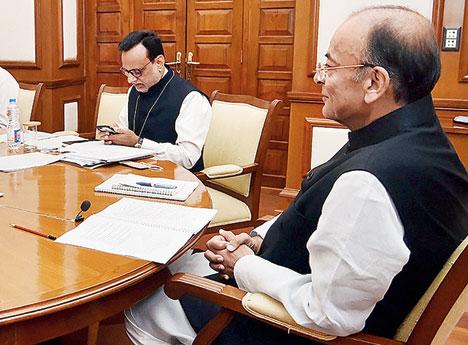WHAT ARE YOU SUGGESTING, SIR?


New Delhi: A transparency test was staring at the Supreme Court after a constitution bench refused on Tuesday to entertain a persistent plea for a copy of an order through which the same bench had been formed to look into a plea linked to the Chief Justice of India.
Following the court's reluctance to furnish the copy of the order, two Congress MPs withdrew their petition challenging the Rajya Sabha chairperson's dismissal of a notice for a motion to impeach Chief Justice Dipak Misra.
Kapil Sibal, senior advocate and Congress leader who represented the petitioners, declined to argue the merits of the case until he could go through the order, find out who issued it and decide whether it could be challenged.
As night fell, the country appeared deeply divided over the highest judicial office in the land. Union finance minister Arun Jaitley posted on Facebook: "The Congress Party was looking for a friendly pitch to bowl on." Other social media users lamented the state of affairs in "New India".
The copy of the order is crucial because it will establish whether it was "administrative" or "judicial".
The nature of the order holds enormous significance. "Judicial orders" are passed by judges sitting in court and after hearing the arguments of lawyers. "Administrative orders" are issued by the Chief Justice of India in his chamber.
A constitution bench is usually formed after a two-judge bench, followed by a three-judge bench, issues a judicial order calling for a bench of five judges. After such an order is issued, the Chief Justice forms the bench.
For less important matters, the Chief Justice issues an administrative order forming either a two-judge or three-judge bench.
On Monday night, it became known that a constitution bench had been formed to look into the petition filed by the two Congress MPs.
However, earlier in the day, the bench of Justice J. Chelameswar, the second senior-most judge, had not issued any judicial order in the courtroom to form such a bench.
If it can be established that the constitution bench, normally formed after a judicial order is issued, was set up through an administrative order, its very formation could be challenged.
This was the reason the petitioners, represented by senior advocate and Congress leader Kapil Sibal, insisted they be given a copy of the order setting up the bench.
Besides, if it emerges that the Chief Justice of India - who usually issues administrative orders - had passed the order to set up the bench to look into a case that involves him, it can throw up other questions.
The official notice issued on Monday night announcing the formation of the constitution bench was signed by the additional registrar handling listings.

On Tuesday afternoon, fresh life was injected into the transparency question when lawyer Prashant Bhushan moved an RTI application seeking a copy of the order.
It remains to be seen how the information officer of the top court responds to Bhushan's application. In 2015, the Supreme Court had held that when a high court or the apex court acts in its administrative capacity, only then is it considered to fall within the definition of "State" for the purpose of disclosing information under the RTI Act.
The five-judge bench that was set up included neither the Chief Justice nor the four remaining collegium members who had held an unprecedented media conference in January to complain about the manner in which Justice Misra allocated cases.
The bench announced on Monday was headed by the sixth senior-most judge, Justice A.K. Sikri, and included Justices S.A. Bobde, N.V. Ramana, Arun Mishra and A.K. Goel.
Justice Sikri acknowledged the uniqueness of the case. "Problem is that this is a piquant situation and an unprecedented one. CJI is a party to the matter.... The other four (collegium) judges have a role in the matter," he said.
Sibal told the bench that a "reference to five judges can only be made by a judicial order. The rules of the Supreme Court do not allow the Chief Justice of India to pass an administrative order to refer a matter to five judges...."
He added: "The petitioners are entitled to know who is that authority who, on the administrative side, passed an order to refer this matter to five distinguished judges. If the authority happens to be the Chief Justice of India, against whom a motion of removal on the basis of certain articles of charge was filed and dismissed by the (Rajya Sabha) chairman... then the petitioners are entitled to be informed of the order and a copy of the order be furnished to the petitioners before any proceedings take place."
When Sibal, who had said he neither had any malice towards anyone nor any agenda, insisted that he wanted to know who had passed the order forming the bench, Justice Sikri said: "Then we feel there is something else."
Sibal responded: "It (the order) is not a secret under the National Security Act."
The senior counsel then sought permission to withdraw the petition, which the bench acceded to.
The court declared the petition "dismissed as withdrawn".










